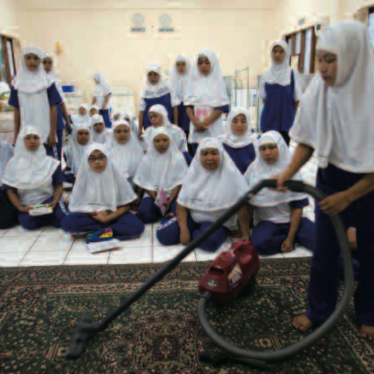(New York) - Saudi authorities should take urgent steps to ensure that migrant workers at Jadawel International's Dhahran compounds who need medical treatment can leave the compounds and the country, Human Rights Watch said today. Saudi authorities should also change a sponsorship system that effectively enables employers to keep employees captive at their work sites, Human Rights Watch said.
Workers for Jadawel International, a Saudi company, at a Dhahran residential compound housing US citizens who work on the nearby airbase told Human Rights Watch that the company failed to renew Saudi residency permits, as required by law, for at least 28 of them. At least three of these workers require medical attention, but without valid residency permits they cannot leave the compound for fear of arrest or obtain exit visas to leave the country, the workers said.
"Saudi enforcement of restrictive residency laws is putting the health of workers at risk because of a possible failure by their employer," said Sarah Leah Whitson, Middle East director at Human Rights Watch. "It is time to abolish these aspects of the sponsorship system that keep foreign workers virtual prisoners and put their health at risk."
Jadawel International did not reply to a Human Rights Watch inquiry on April 15 about the company's failure to renew migrant workers' residency permits and to pay salaries on time, another issue raised by the workers.
One worker, a supermarket salesman, made plans five months ago to undergo an operation in his native India, but Jadawel International failed to renew his residency permit when it expired a few months ago, fellow workers said. The worker is now trapped, unable to leave for India because he lacks a residency permit, a passport, which Jadawel International is holding, and an exit visa.
Another Indian man working at the compound has been experiencing increased numbness and paralysis in one leg over the past several weeks. Fellow workers said he was unable to obtain medical assistance for fear of arrest for being out of legal residency status if he left the compound. They say that Jadawel International failed to renew his residency permit before it expired two months ago.
A third person in the compound told Human Rights Watch that a migrant worker experienced what appeared to be a heart attack on April 10, but that he would not go to a hospital off the compound for fear of arrest because his residency permit had expired.
Under articles 3 and 14 of Saudi Arabia's 1952 residency law, foreign workers must obtain an exit visa to leave the country. Without a valid residency permit or an exit visa stamped in the passport, the migrant worker can only leave through deportation. The Saudi Council of Ministers abolished the sponsorship system on paper on October 9, 2000, in its Decision 166, granting the worker the right to obtain an exit visa directly from the General Directorate of Passports, among other provisions. But this decision has not been carried out.
It is the obligation of the employing sponsor to renew workers' residency permits under penalty of law. Some of the workers Human Rights Watch spoke to alluded to problems Jadawel International was having with the Saudi General Directorate of Passports and the Saudi Chamber of Commerce, which facilitates requests for recruitment of foreign labor.
Workers told Human Rights Watch, that Jadawel International had confiscated the passports of all non-skilled foreign workers. Article 3 of Council of Ministers Decision 166 stipulated that a migrant worker must keep his or her own passport. However, according to a 2008 study by the National Society for Human Rights, Saudi Arabia's first registered rights organization, the General Directorate of Passports has failed to implement this decision and to penalize employers who confiscated passports, effectively denying workers the right to leave of their own accord. The government has revealed no steps to implement the decision.
International human rights law recognizes the right of every person to freedom of movement within a state, and to leave any country, and to return to his or her own country. Furthermore, every person has the right to access medical care.
Workers also reported to Human Rights Watch that Jadawel International failed to pay their salaries on time. They said that the company was five months in arrears, having last paid workers' salaries only through November 2009. Workers who had been at the Dhahran compound for 15 years or longer said that Jadawel International had never paid them on time. Before being paid up to November 2009, one worker said, he went without pay between February and June 2009. Another worker said that in 2008 he went for eight months without pay. Only Saudi security guards working there were being paid on time, the workers said.
Workers in Jadawel International's Dhahran compound stopped work on April 10. They returned to work on April 12, after managers conveyed the intention of Shaikh Mohamed bin Issa Al Jaber, the chairman of MBI International, Jadawel International's parent company, to solve their problems soon.







